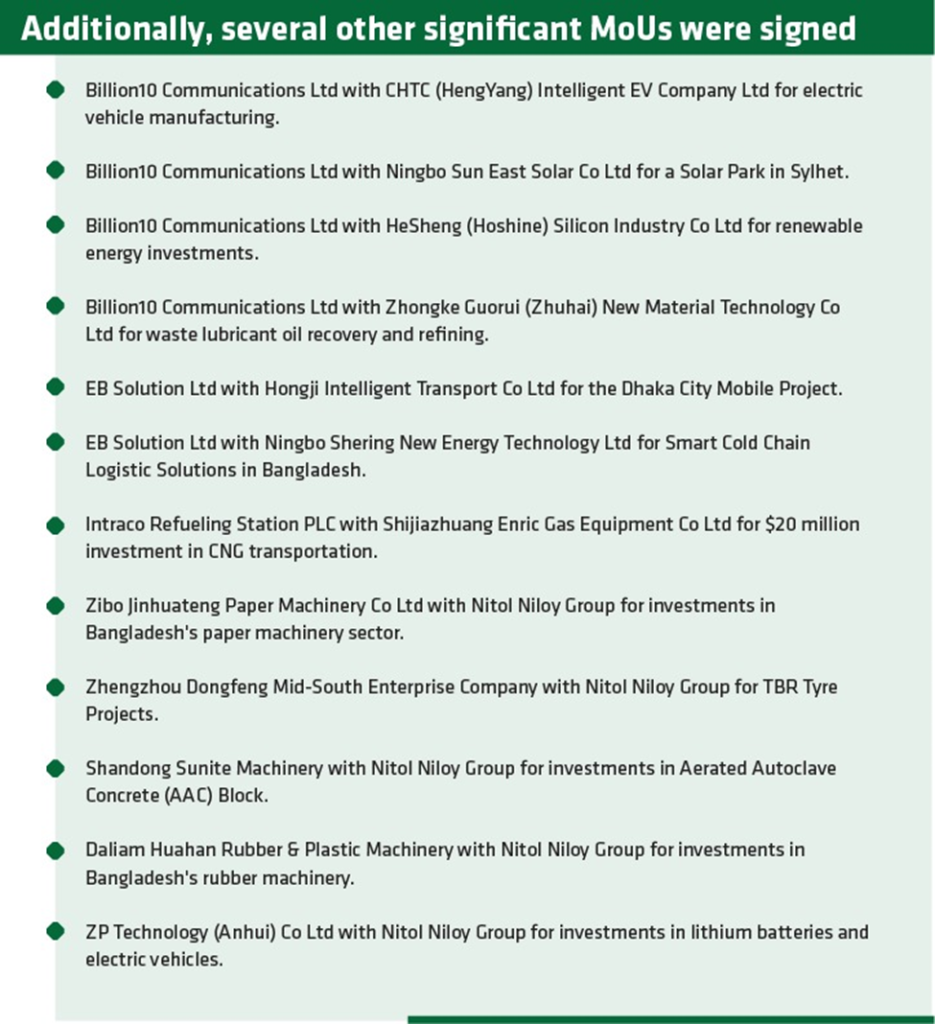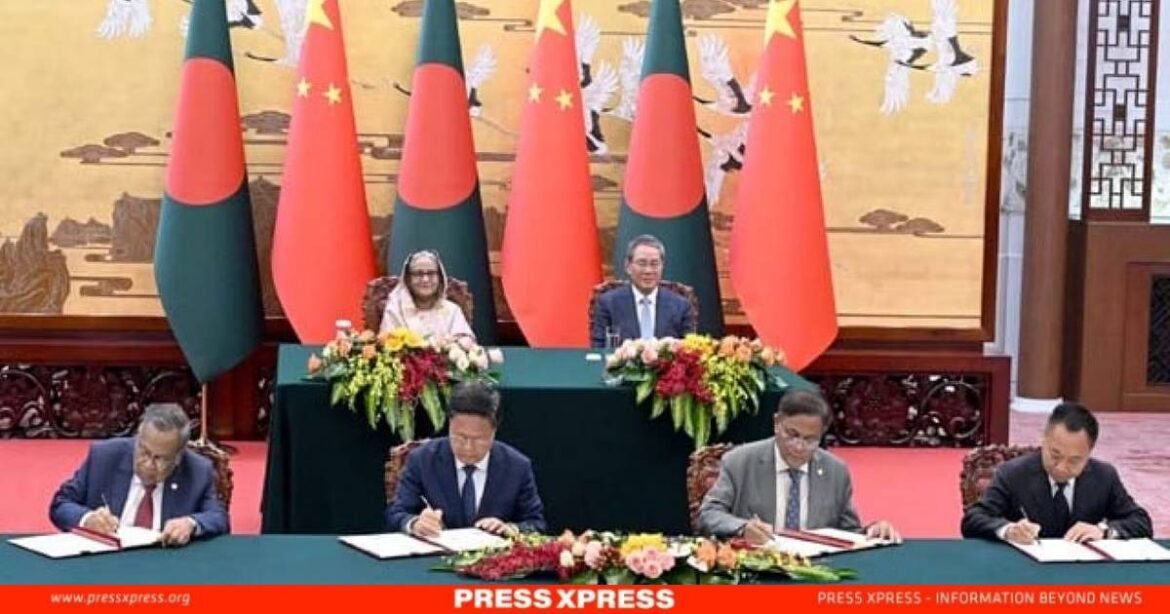The bilateral talks mainly featured the Rohingya issue, business, trade and commerce, investments, and bilateral relations alongside various regional and international matters
In a significant diplomatic development, China and Bangladesh have elevated their relationship from a ‘strategic partnership’ to a ‘comprehensive strategic cooperative partnership’ through the signing of 21 deals and the announcement of 7 additional projects. This move marks a new chapter in the bilateral relations between the two Asian nations, spanning various sectors and promising mutual benefits.
You can also read: PM Hasina Pitches Bangladesh as Prime Investment Hub to Chinese Investors
The agreements were signed in Beijing at the Great Hall of the People, with Bangladesh Prime Minister Sheikh Hasina and Chinese Premier Li Qiang presiding over the ceremony. Before the signing, Prime Minister Hasina was accorded a red-carpet reception, symbolizing China’s importance in this diplomatic engagement. The leaders engaged in delegation-level talks, focusing on crucial issues such as the Rohingya crisis, trade and commerce, investments, and regional and international matters.

Implications for Bilateral Relations
This comprehensive set of agreements and projects signifies a deepening of ties between China and Bangladesh. It encompasses various crucial sectors including trade, investment, infrastructure, technology, and cultural exchange.
The agreements are likely to boost economic cooperation, with the potential Free Trade Agreement and investment treaty optimization paving the way for increased trade and investment flows. Infrastructure projects will enhance connectivity within Bangladesh, while cooperation in areas like digital economy and green development align with both countries’ modernization goals.
As these initiatives unfold, they are expected to have far-reaching impacts on the economic landscape of Bangladesh and further solidify China’s role as a key partner in South Asia’s development.
The signed instruments are:
1. The MoU on Strengthening Investment Cooperation in the Digital Economy.
2. The MoU on Banking and Insurance Regulatory between China National Financial Regulatory Administration (NFRA) and Bangladesh Bank.
3. A Protocol of Phytosanitary Requirements Export of Fresh Mangoes from Bangladesh to China.
4. The MoU on Exchange and Cooperation in the field of Economic Development Policy.
5. The MoU on Trade and Investment Cooperation.
6. The MoU on Strengthening Digital Economy Cooperation.
7. Signing of Minutes of Discussions on the Feasibility Study of the China-aid National Emergency Operation Center in Bangladesh Project.
8. Exchange the Letter on the China-aid 6th Bangladesh-China Friendship Bridge Renovation Project.
9. Exchange the Letters on the Feasibility Study of China-aid Construction of Nateshwar Archaeological Site Park in Bangladesh Project.
10. Exchange the Letters on the China-aid 9th Bangladesh-China Friendship Bridge Project.
11. The MoU on Strengthening the Cooperation in Medical Care and Public Health.
12. The MoU on Strengthening the Infrastructure Cooperation.
13. The MoU on Cooperation on Green and Low-Carbon Development.
14. Renewing the MoU on Provision of Hydrological Information of the Yaluzangbu/ Brahmaputra River in Flood Season by China to Bangladesh.
15. The MoU between National Radio and Television Administration and the Ministry of Information and Broadcasting of Bangladesh.
16. The MoU between the China Media Group (CMG) and Bangladesh Sangbad Sangstha (BSS).
17. The MoU between the China Media Group (CMG) and BTV.
18. An Agreement between the Xinhua News Agency and BSS.
19. An Agreement between the Xinhua News Agency and BTV.
20. Renewing the MoU between the Ministry of Education of China and the Ministry of Education of Bangladesh.
21. The MoU Regarding Public-Private Partnership for Sustainable Infrastructure Development.
Among the notable agreements, Bangladesh Sangbad Sangstha (BSS) Managing Director and Chief Editor Abul Kalam Azad signed two significant documents. A Memorandum of Understanding was inked with the China Media Group (CMG), and an Agreement was signed with the Xinhua News Agency. These agreements aim to enhance information exchange and promote mutual understanding between the media sectors of both countries.
7 announced projects are:
1. Announcement of the Conclusion of the Joint Feasibility Study on China-Bangladesh Free Trade Agreement.
2. Announcing the commencement of negotiation on the Optimization of China-Bangladesh Bilateral Investment Treaty.
3. Announcing the completion of the Modernization of Telecommunication Network for Digital Connectivity project.
4. Announcing the completion of the Single Point Mooring trial run with the Double Pipe Line project.
5. Announcing the commencement of Rajshahi WASA Surface Water Treatment Plant.
6. Signing the MoU between Shandong Agricultural University and Bangabandhu Sheikh Mujibur Rahman Agricultural University, Gazipur.
7. Announcing the construction of Luban Workshop in Bangladesh.
Previously Signed MoUs with China
At the summit, Bangladeshi and Chinese companies inked 16 MoUs aimed at enhancing investment in Bangladesh, securing $490 million in funding across four key agreements:
- Nagad and Huawei Technologies (Bangladesh) Ltd. signed an MoU worth $50 million, forging a strategic partnership to develop a next-generation digital financial platform for a SMART Bangladesh.
- Dex Bangladesh Tech Ltd and Huawei Technologies (Bangladesh) agreed on a $20 million investment for the ‘Bangladesh Capital Market Digital Transformation Project’.
- Deshbondhu Group, Chemtex, and China Chemical CNCC signed a $400 million MoU to establish the largest PSF, PET bottle, and Textile grade factory in the Mongla Economic Zone.
- China Road and Bridge Corporation (CRBC) and Ningbo Cixing Company Limited agreed on an investment framework for Bangladesh’s Chinese Economic and Industrial Zone.

As these initiatives unfold, they are likely to have far-reaching impacts on the economic landscape of Bangladesh and further solidify China’s role as a key partner in South Asia’s development. This enhanced partnership comes at a time of shifting global dynamics and increasing focus on Asian economies, representing not just a bilateral achievement but a significant development in the broader context of South Asian geopolitics and economic cooperation.
The comprehensive nature of this cooperation underscores the growing importance of Bangladesh in China’s regional strategy and sets the stage for a new era of collaboration between the two nations.
It is reported that Prime Minister Sheikh Hasina departed for Beijing on July 8 for a four-day bilateral visit.


